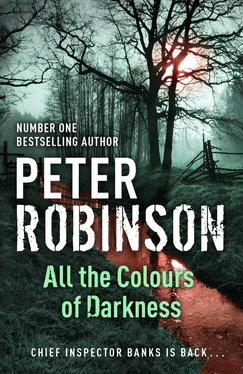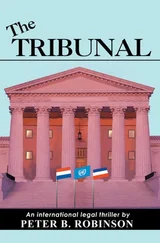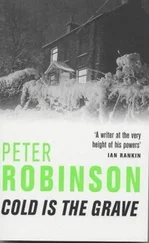Peter Robinson - All the Colors of Darkness
Здесь есть возможность читать онлайн «Peter Robinson - All the Colors of Darkness» весь текст электронной книги совершенно бесплатно (целиком полную версию без сокращений). В некоторых случаях можно слушать аудио, скачать через торрент в формате fb2 и присутствует краткое содержание. Город: London, Год выпуска: 2008, ISBN: 2008, Издательство: Hodder & Stoughton, Жанр: Полицейский детектив, на английском языке. Описание произведения, (предисловие) а так же отзывы посетителей доступны на портале библиотеки ЛибКат.
- Название:All the Colors of Darkness
- Автор:
- Издательство:Hodder & Stoughton
- Жанр:
- Год:2008
- Город:London
- ISBN:978-0-340-83692-7
- Рейтинг книги:5 / 5. Голосов: 1
-
Избранное:Добавить в избранное
- Отзывы:
-
Ваша оценка:
- 100
- 1
- 2
- 3
- 4
- 5
All the Colors of Darkness: краткое содержание, описание и аннотация
Предлагаем к чтению аннотацию, описание, краткое содержание или предисловие (зависит от того, что написал сам автор книги «All the Colors of Darkness»). Если вы не нашли необходимую информацию о книге — напишите в комментариях, мы постараемся отыскать её.
All the Colors of Darkness — читать онлайн бесплатно полную книгу (весь текст) целиком
Ниже представлен текст книги, разбитый по страницам. Система сохранения места последней прочитанной страницы, позволяет с удобством читать онлайн бесплатно книгу «All the Colors of Darkness», без необходимости каждый раз заново искать на чём Вы остановились. Поставьте закладку, и сможете в любой момент перейти на страницу, на которой закончили чтение.
Интервал:
Закладка:
“Was that because of Cedric?”
“What?”
“When you spoke about your husband, you told me he had worked for the Secret Intelligence Service during the war, and that he still had connections. He died in a car crash at the height of the Suez crisis, when he was involved in some Middle Eastern oil deal. Didn’t that set off any alarm bells?”
“I suppose it did,” said Edwina. “Cedric was a good driver, and there was no investigation.”
“So when Laurence also died under suspicious circumstances, it occurred to you that there might be a connection?”
“I asked Dicky Hawkins at the time of Cedric’s death. Of course he denied it, but there was something in his manner, body language... I don’t know.”
“So you think Cedric might have been killed?”
“That’s the problem with these people, Mr. Banks,” Edwina said. “You just never really know, do you? And now I really must go. I’m tired. Good night.” She hung up.
When Banks put the phone down he could hear Sarabeth Tucek singing “Stillborn,” one of his favorites. So the Hardcastle-Silbert case, such as it was, was over, even if it had been all Derek Wyman’s malicious doing. They’d let Wyman walk out, a free man. There was nothing they could charge him with, and no matter what Edwina Silbert thought, no way they could refute his story, though Banks did suspect that there was more to it than he had told them, that what they had witnessed in the interview room was more of a performance than a confession, and that Wyman had simply managed to stay one step ahead and come up with a foolproof explanation when he needed one. Hardcastle and Silbert were dead, Wyman was responsible for their deaths, whether intentionally or not, and he had walked away.
Now that he was finished with Wyman, he could devote more thought to his other problem: Sophia. It couldn’t be insurmountable, he believed; there had to be a way of salvaging the relationship, perhaps it was even as simple as just letting a little time pass. Maybe it would also help to convince her that he wasn’t responsible if he let her into one or two more details of the case, including his conversation with Burgess. And a present wouldn’t go amiss, he was certain. Not a CD, but something unique, something that could become a part of her “collection.” He couldn’t replace what she had lost, of course, but he could offer something new, something that, in time, would grow into its own story, would acquire its own pedigree and tradition. By finding the right object, he could demonstrate that he understood, that he knew how important these things were to her, and that he knew it wasn’t just a materialistic obsession. And he thought that he did understand. It was a plan, at any rate.
Nearly an hour passed, and Banks had just switched Sarabeth for Cat Power’s The Covers Album, which opened with a slow, acoustic and almost unbearably sad version of “(I Can’t Get No) Satisfaction,” when his phone rang. He didn’t immediately recognize the voice. “Alan?”
“Yes.”
“This is Victor, Victor Morton. Sophia’s father. How are you?”
“I’m fine,” said Banks. “What can I do for you?”
“You can tell me what’s going on, for a start.”
Banks’s heart lurched into his throat. Christ, had Sophia told her father about the break-in? Was Victor going to blame Banks, too? “What do you mean?” he asked, with a dry mouth.
“I had a very interesting conversation with an old colleague yesterday,” Victor went on. “We met just by chance in the street, if you can believe that, and he suggested we have a drink together.”
“Who was it?”
“His name doesn’t matter. It was someone I knew from Bonn, someone I never liked, always suspected of being a bit... well, rather like the fellow we were talking about the other day.”
“Like Silbert? A spy?”
“Do you have to spell everything out for whoever’s listening?”
“It doesn’t matter,” said Banks. “The case is closed. Hardcastle suspected Silbert was having an affair and hired someone to get the evidence. Official version. It was just plain lover’s jealousy, after all, and it went terribly wrong. It’s over.”
“Well, perhaps someone should tell my colleague that.”
“What do you mean?”
“It started off as a pleasant-enough conversation, old times, retirement, pension plans and the like, then he started to ask about you, what I thought about you as a detective, how I felt about your relationship with my daughter.”
“And?”
“I don’t like being grilled, Alan. I told him nothing. Then he moved on, in a roundabout sort of way, started talking about how it is in consulates and embassies all over the world, how you pick up odd bits of information, pieces of the puzzle, things that are usually best forgotten. I simply agreed with him. Then he asked me if I knew anything about a man called Derek Wyman. I said no. Do you know this person?”
“He was the one,” Banks said. “The one who Hardcastle asked to get the evidence. But it was nothing to do with secrets, at least not the government kind. As I said, it was all to do with jealousy.”
“Well, he harped on about this Wyman for a while, was I sure I didn’t know him and so on, then he asked after my ‘lovely’ daughter Sophia—he actually mentioned her name—how she was doing. I told him fine as far as I knew and got my things together to leave. I’d had enough by then. Just as I was about to go, he grabbed my sleeve and told me to be careful. That’s all he said. No overt threat. Just ‘Be careful, Victor.’ Now what do you think that was all about?”
“Melodrama,” said Banks, nonetheless feeling his flesh crawl as he tried to shrug it off. “They love melodrama almost as much as they love games and codes.”
“Well, I hope so, Alan. I sincerely hope so. Because if anything happens to my daughter, I’ll—”
“If anything happens to your daughter, you’ll have to get in line, and I’ll be the first in the queue.”
“Just as long as we understand one another.”
“We do,” said Banks. “Good-bye, Victor.”
Banks sipped some wine and stroked his chin, feeling the two days’ stubble, thinking over what he’d just heard. Sometime later, Cat Power went into a stark and desolate “Wild Is the Wind” and a cloud cast a dark shadow shaped like a running deer as it drifted slowly over the daleside. Banks reached for the wine bottle.
The shadows were lengthening when Winsome and Doug Wilson, along with the few uniforms they had brought with them as support, approached Hague House. If the Bull was armed, then he might be dangerous. The officers were carrying a miniature battering ram, affectionately known as a “big red door key,” which they would use to break the door down if they got no answer. More uniforms were stationed at the bottom of the stairwells, where a small crowd had gathered. Andy Pash had reluctantly given an official statement, which gave them sufficient cause to bring the Bull in as a serious suspect in the Donny Moore stabbing. They had also managed to dig up his real name, which was Toros Kemal—hence the Bull, though Winsome doubted that “toros” meant bull in Turkish—and his criminal record, which was lengthy.
The lifts were out of order, as usual, so they had to climb the stairs on the outside of the building. Luckily, Kemal lived on the second floor, so they didn’t have too far to climb. One or two lurkers in the shadows scarpered pretty quickly when they saw the uniforms.
Winsome found the green door easily enough. She could hear the sound of a television from inside. Andy Pash had let slip that Kemal was living with a young woman called Ginny Campbell, who was on the council list as the only tenant. She had two young children by another man, so there was a potential hostage situation and they would have to be careful.
Читать дальшеИнтервал:
Закладка:
Похожие книги на «All the Colors of Darkness»
Представляем Вашему вниманию похожие книги на «All the Colors of Darkness» списком для выбора. Мы отобрали схожую по названию и смыслу литературу в надежде предоставить читателям больше вариантов отыскать новые, интересные, ещё непрочитанные произведения.
Обсуждение, отзывы о книге «All the Colors of Darkness» и просто собственные мнения читателей. Оставьте ваши комментарии, напишите, что Вы думаете о произведении, его смысле или главных героях. Укажите что конкретно понравилось, а что нет, и почему Вы так считаете.












